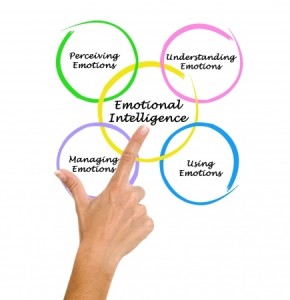 Dr. Reuven BarOn, the creator of the EQi or Emotional Quotient Inventory, (the first scientifically developed and validated measure of emotional intelligence) states that emotional intelligence can increase organizational productivity by increasing leadership performance. He defines emotional intelligence, or EQ, as a “cross section of emotional and social competencies that determine how well we understand and express ourselves, relate with others and cope with daily demands and pressures.” It includes self awareness, self motivation, empathy, managing ones mood and relationships.
Dr. Reuven BarOn, the creator of the EQi or Emotional Quotient Inventory, (the first scientifically developed and validated measure of emotional intelligence) states that emotional intelligence can increase organizational productivity by increasing leadership performance. He defines emotional intelligence, or EQ, as a “cross section of emotional and social competencies that determine how well we understand and express ourselves, relate with others and cope with daily demands and pressures.” It includes self awareness, self motivation, empathy, managing ones mood and relationships.
Usually when it comes to productivity, people are focused on getting all of their tasks done in an efficient manner, but we need to look at EQ, as it can play a big role in increasing productivity in the workplace. Having high EQ positively impacts productivity and ultimately, the bottom line.
Right now, companies have fewer employees who are expected to do more work in the same amount of time they’ve always had. They’re doing more with less; more work, fewer workers, less money for the jobs they perform. With this in mind, it’s more important now than it ever was to work smarter, not harder. Working smarter and not harder is something that organizations have to do for ultimate productivity and incorporating EQ will contribute to just that.
Research has demonstrated a strong association between EQ and job performance. It has shown that when emphasis is placed on emotional intelligence in the work place, problem solving and decision-making improve as well as the ability to cope with change. Thus, companies employing EQ maximize their potential for increased productivity and overall business success because their employees are more powerfully connected.
Building relationships is a key skill when it comes to EQ and we know that real business is based upon relationships. People do business with those they know, like and trust, so relationships are key. An individual with strong relationship building capabilities is able to create relationships at all levels within and outside of their organization, which enables them to operate effectively even in undesirable environments because they have that skill. Leaders with that skill tend to have greater access to decision makers because of the relationships they have with them. Additionally, they may be afforded opportunities that others won’t because they’ve devoted time to building relationships. At the end of the day, the organization’s overall productivity increases.
Dr. BarOn’s research with Beefeater’s demonstrated that improving the EQ of managers does increase organizational productivity. Their restaurants’ annual profit increase was directly related to increase in managers’ EQ. That research also concluded that there were correlations between EQ and managerial performance, team and customer satisfaction.
EQ is something that we can increase or improve, and it is just as important to develop as technical disciplines. Research has proven that with the right training it is possible to raise emotional intelligence skills to help individuals in the workplace. EQ skills can give those who may not have done so great academically an advantage over those who carried great academic averages. EQ has been proven to be the major indication in whether individuals stand out in their careers.
The argument for including and fostering these capabilities is further strengthened by the fact that the workplace is the perfect setting for people to develop their EQ because it tends to fuel them forward in search of promotion within the company. Employees gain the skills that increase their performance and productivity in their personal and professional lives and the organization has a team that is solid, supportive and cohesive. With a workforce that has high EQ capabilities companies can rise to the need to work smarter not harder so they contribute to the company’s overall productivity.
We know that individuals and organizations as a whole with high EQ levels experience greater success. If companies include quality EQ training and coaching in their programs they not only increase the EQ of their employees, but also raise morale and ultimately the performance of the company. If they make the investment, the result is a better equipped, more connected workforce and a better looking bottom line.
©2010 Sheila Hawkins
